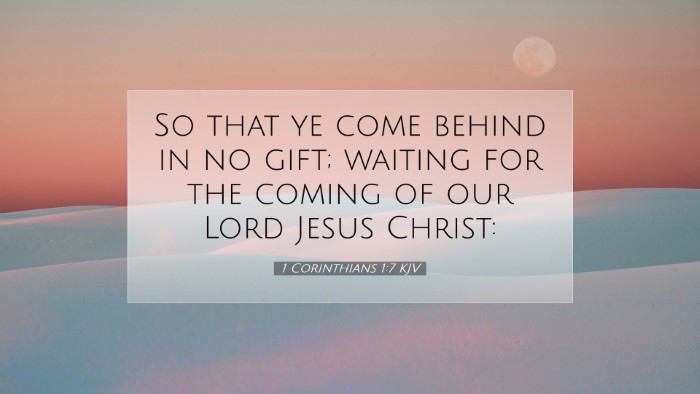Commentary on 1 Corinthians 1:7
The Apostle Paul, writing to the Corinthians, addresses a church beset by divisions and moral challenges. The specific verse, 1 Corinthians 1:7, states:
"So that you come short in no gift; eagerly waiting for the revelation of our Lord Jesus Christ."
Contextual Background
The Corinthian church was established in a city known for its wealth, culture, and, unfortunately, its immorality. Paul writes this epistle to address various issues affecting the church, providing guidance and correction.
Insight from Matthew Henry
Henry remarks on the richness of spiritual gifts in the Corinthian church. He notes that despite their moral failures, they were enriched in knowledge and utterance, which means they had a flourishing experience of the Holy Spirit’s presence.
- Spiritual Endowments: Henry emphasizes that every believer is equipped with spiritual gifts, which are essential for the building up of the church.
- Lack of Deficiency: He indicates that the phrase "come short in no gift" suggests a completeness in God’s provision for His people, demonstrating His faithfulness even amidst human shortcomings.
- Anticipation of Christ's Revelation: The eagerness for the return of Christ reveals a key element of Christian hope, which should motivate believers to live in holiness and expectation.
Insights from Adam Clarke
Adam Clarke expands on the implications of the gifts given to the Corinthians. He highlights a few key elements:
- Divine Generosity: Clarke notes that the gifts serve as a manifestation of God's grace, showing that despite the church's challenges, they are favored by God.
- Waiting for Christ: The anticipation of the revelation of Christ is a central theme in Pauline theology, encouraging believers to focus on their future hope, which motivates their present conduct.
- Unity in Gifts: Clarke argues that the variety of gifts should lead to unity within the church as each member contributes to the common good in the context of their unique abilities.
Albert Barnes' Commentary
Barnes offers a theological perspective that emphasizes the security and assurance believers have in their relationship with God and the gifts they have received:
- No Gift Lacking: He reinforces the notion that every gift is provided for believers, indicating God’s commitment to equip them for the mission and challenges ahead.
- Eager Expectation: Barnes outlines that the waiting is not passive; rather, it is an active anticipation that shapes the behavior and attitudes of believers.
- Confidence in Christ's Return: The expectation that accompanies the longing for Christ’s return enkindles spiritual zeal and encourages perseverance amidst trials.
Practical Applications
The teachings drawn from this verse can have profound implications for the church today:
- Recognition of Gifts: Believers should be encouraged to identify and utilize their spiritual gifts for the edification of the church.
- Cultivating Unity: Understanding that every member contributes to the church's overall mission can foster unity and cooperation within the body of Christ.
- Living in Expectation: Cultivating an attitude of eager expectation for the return of Christ can inspire believers to lead lives that are faithful and diligent.
Theological Reflections
Several theological themes arise from this brief verse:
- The Nature of Spiritual Gifts: The verse reiterates the theological understanding that spiritual gifts are not given based on merit but are a result of divine grace.
- The Assurance of Salvation: The readiness implied in 'coming short in no gift' speaks to the assurance of God’s sustenance in believers’ lives as they await the final revelation.
- Hope as Motivation: The emphasis on waiting for Christ’s revelation frames a hopeful eschatological outlook which should influence Christian ethics and behavior.
Conclusion
In 1 Corinthians 1:7, Paul encapsulates a vital teaching for believers in Corinth and for us today. The richness in gifts given by the Holy Spirit serves as both a testament to God’s faithful provision as well as a call to active participation in the life of the church. The anticipation of Christ’s revelation not only provides comfort but also urges believers to live in a way that reflects their calling as followers of Christ.


